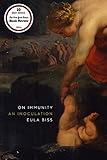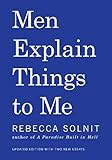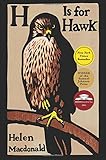They say it is a symptom of aging when one begins to see historic catastrophe looming in the events of the world. “Times are bad,” Cicero is supposed to have said in the first century B.C. “Children no longer obey their parents, and everyone is writing a book.” I’m not the first to remark that this same Ciceroian sentiment sums up plenty of recent articles to the tune of Millennials, amirite tho? All the same, sometimes the center really cannot hold. Things do fall apart. The widening ocean gyre turns and turns and is full of plastic. What if the falcon really cannot hear the falconer? And what rough and bloviating beast, with fake tan and tawny comb-over, slouches towards Bethlehem to be born?
It is when the passionate intensity of the world’s worst aspects gets too much that I turn to the conviction of books. When I decided to take the books that had the biggest impact on me this year down from the shelf and lay them like tiles on the bedspread, I noticed a theme. They were all, in some way or other, about our broken world. Taken together, they formed a kind of atlas, articulating the wounded geography of the Earth’s subtle body: the Republic of Community, the Sea of Politics, the United States of Racism and Rape Culture, the Desert of Personal Tragedy, and the Empire of Environmental Loss.
It went like this.

 I read Eula Biss’s On Immunity early in the year. Although it is ostensibly about vaccination, like all excellent nonfiction it transcends its stated focus. It is about community, and how we imagine the boundaries between self and other, between “us” and “not us.” It addresses our human permeability and the fact that no matter how much we may seek to isolate ourselves, even at the most basic biological level we as human beings are all in the same boat.
I read Eula Biss’s On Immunity early in the year. Although it is ostensibly about vaccination, like all excellent nonfiction it transcends its stated focus. It is about community, and how we imagine the boundaries between self and other, between “us” and “not us.” It addresses our human permeability and the fact that no matter how much we may seek to isolate ourselves, even at the most basic biological level we as human beings are all in the same boat.
Speaking of community, I also read Destiny Disrupted: A History of the World Through Islamic Eyes by Tamim Ansary. As someone familiar with the politics and history of the Middle East, I am sometimes asked if I can recommend “the one book” a person might read who wished to understand the region better. I will now recommend this book. It isn’t perfect, but it is a good place to start.


 On the environment, I read four books that worked especially well when taken in chorus. They were: Waste by Brian Thill, This Changes Everything by Naomi Klein, The Sixth Extinction by Elizabeth Kolbert, and Moby Duck: The True Story of 28,800 Bath Toys Lost at Sea and of the Beachcombers, Oceanographers, Environmentalists, and Fools, Including the Author, Who Went in Search of Them, by Donovan Hohn. Thill describes types of human detritus, from excess browser tabs cluttering our laptop screens to the radioactive byproducts of nuclear energy that will be dangerous long after the demise of everything else we have ever created. Kolbert takes the reader on a tour through the shrinking biosphere, and Klein delineates the forces of greed that lie behind its destruction. Hohn’s Melvillian odyssey brings an essential element of the personal — the frail, the tender, the humane — to what is so often sweepingly abstract about the ecological wars we are waging.
On the environment, I read four books that worked especially well when taken in chorus. They were: Waste by Brian Thill, This Changes Everything by Naomi Klein, The Sixth Extinction by Elizabeth Kolbert, and Moby Duck: The True Story of 28,800 Bath Toys Lost at Sea and of the Beachcombers, Oceanographers, Environmentalists, and Fools, Including the Author, Who Went in Search of Them, by Donovan Hohn. Thill describes types of human detritus, from excess browser tabs cluttering our laptop screens to the radioactive byproducts of nuclear energy that will be dangerous long after the demise of everything else we have ever created. Kolbert takes the reader on a tour through the shrinking biosphere, and Klein delineates the forces of greed that lie behind its destruction. Hohn’s Melvillian odyssey brings an essential element of the personal — the frail, the tender, the humane — to what is so often sweepingly abstract about the ecological wars we are waging.


 I read Men Explain Things to Me by Rebecca Solnit and Between the World and Me by Ta-Nehisi Coates, back-to-back in about 48 hours; both, in their own way, a kind of manifesto. I read the first with nodding recognition, and the second with a deepening sense of what my privilege as a white person has shielded me from. I recommend them as companion works.
I read Men Explain Things to Me by Rebecca Solnit and Between the World and Me by Ta-Nehisi Coates, back-to-back in about 48 hours; both, in their own way, a kind of manifesto. I read the first with nodding recognition, and the second with a deepening sense of what my privilege as a white person has shielded me from. I recommend them as companion works.
I loved the novel Mr. Fox by Helen Oyeyemi, which consists of many different ways to tell the same story, or variations on a theme. I was floored by it for similar reasons that I loved a retrospective of the painter Gerhard Richter I saw at MoMA many years ago: the use of multiple styles in an attempt to find the truth. Richter is an artist whose work has taken so many different forms, from abstract pigments scraped across a canvas to the most impressive photorealism. When all viewed together, his works look like many different attempts to break into the same room, by a person so intent on reaching it that he’ll try anything. The nature of this room that he’s trying to break into by any means necessary remains something of a mystery; its opacity is not entirely breached. So too, with Mr. Fox. Still, the sheer inexhaustibility of the attempts suggests the transcendent importance of whatever lies, or crouches or, probably, glows within its locked walls. This is how I felt reading Oyeyemi, once I got a sense of what she was playing at.
 I want to say that I’ve included Mr. Fox here because it is a kaleidoscopic take on love and pain; that the whole world is a kaleidoscope of love and pain, of beauty and nothingness, problem and solution. I want to say that our view of it is kaleidoscopic, the colors tumbling and rearranging themselves with each turn of the lens. The theme of my reading this year was of our tumbling, broken world, yes, but also of the light that fills it. This light was perhaps best expressed in H Is for Hawk by Helen Macdonald. The scope may seem small: one person, existing in the physical world, while trying to cope with the loss of another person. But it isn’t small. Because what good are empires, or politics, or the Earth itself, if we do not have the ones we love beside us? Things fall apart, it’s true. But it was cathartic to run through the dark, wet forest with Macdonald and her goshawk, Mabel, and to come out into the light again; one falconer at least who brought her wild bird to heel.
I want to say that I’ve included Mr. Fox here because it is a kaleidoscopic take on love and pain; that the whole world is a kaleidoscope of love and pain, of beauty and nothingness, problem and solution. I want to say that our view of it is kaleidoscopic, the colors tumbling and rearranging themselves with each turn of the lens. The theme of my reading this year was of our tumbling, broken world, yes, but also of the light that fills it. This light was perhaps best expressed in H Is for Hawk by Helen Macdonald. The scope may seem small: one person, existing in the physical world, while trying to cope with the loss of another person. But it isn’t small. Because what good are empires, or politics, or the Earth itself, if we do not have the ones we love beside us? Things fall apart, it’s true. But it was cathartic to run through the dark, wet forest with Macdonald and her goshawk, Mabel, and to come out into the light again; one falconer at least who brought her wild bird to heel.
More from A Year in Reading 2015
Don’t miss: A Year in Reading 2014, 2013, 2012, 2011, 2010, 2009, 2008, 2007, 2006, 2005
The good stuff: The Millions’ Notable articles
The motherlode: The Millions’ Books and Reviews
Like what you see? Learn about 5 insanely easy ways to Support The Millions, and follow The Millions on Twitter, Facebook, Tumblr.









